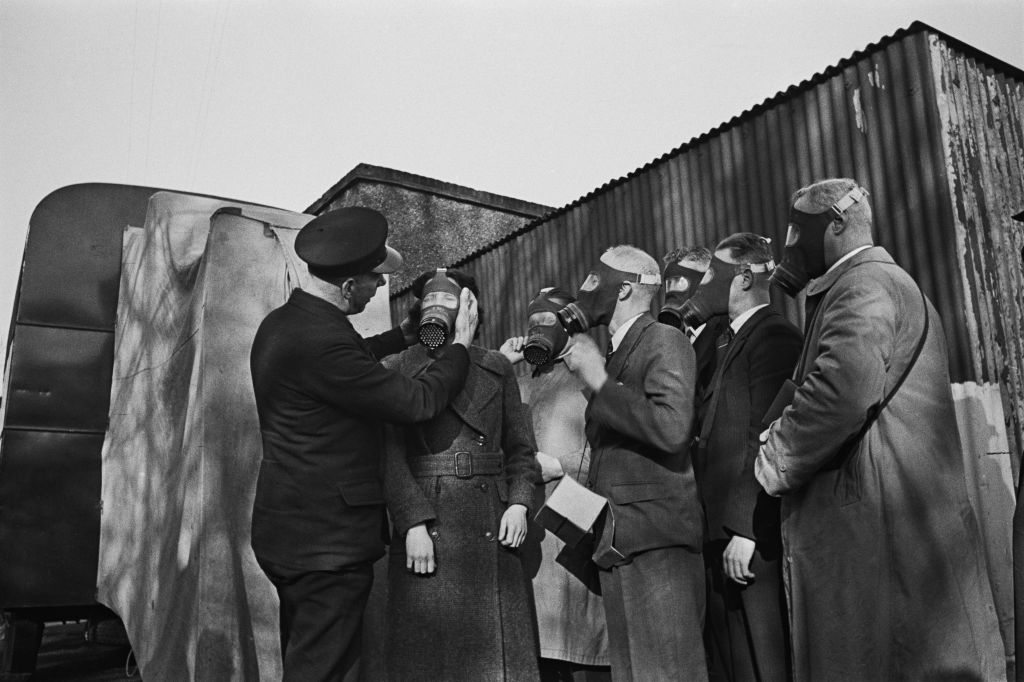Britain has been here before when it comes to furores about face masks. Exactly 80 years ago the same argument was raging, with the country split between those who wanted the wearing of gas masks to be made compulsory on pain of financial penalty, and those who maintained it should be an individual choice.
Unlike today’s virus, the threat facing the country in the summer of 1940 was a destructive Nazi war machine that in a matter of months had torn through most of western Europe. Britain was next in Hitler’s sights and an aerial gas attack was what the government feared most.
In 1938 Neville Chamberlain’s government, aided by a coterie of academics and intellectuals, launched its own ‘Project Fear’. Books were written and official pamphlets distributed, warning the public of the likely death toll in the event of a prolonged German air offensive. Privately, the Ministry of Health predicted that 600,000 Britons would die in the first six months of the aerial war, with a further 1.2 million wounded.
In 1938 the government began issuing gas marks to the entire population and most people had one when war began on 3 September 1939. The government requested that people carry their mask with them at all times in its flimsy cardboard container; there was no obligation but it was strongly recommended.
Each week in Birmingham the police retrieved hundreds of discarded masks
But the Luftwaffe didn’t arrive and people soon tired of going everywhere with their mask. A man in Oldham was fined 10s. 6d. for using his as a football, but while there were penalties for damaging government property, there were none for refusing to carry a mask. Instead the government enlisted the media and business to try and win round the public.
Mannequins in the windows of city department stores were fitted with gas masks, and the Queen appeared in public sporting a grey velvet corduroy gas mask case on her shoulder. Fashion labels brought out their own cases, including a popular suede triangular container with two short handles that resembled a second handbag.
But as the ‘Phoney War’ stretched into 1940, a growing number of Britons dumped their masks. The Luftwaffe were nowhere to be seen so what was the point? People flocked to the seaside at Easter, with the Liverpool Echo reporting that it had never seen Blackpool so busy. ‘The gas mask has almost disappeared in civilian circles,’ said the paper.
In Birmingham, the Daily Gazette noted the ‘complete indifference’ to the carrying of gas masks. Each week in the city the police retrieved hundreds that had been discarded in buses, pubs and cinemas.
After the German invasion of the Low Countries on May 10, 1940, the government (now led by Winston Churchill) launched a fresh campaign about the importance of gas masks. Vans fitted with loudspeakers toured town and city centres but, as the Crawley Observer noted on May 18, ‘despite the appeal very few local people were seen carrying them after.’
Among those in London who refused to carry a mask was George Orwell. ‘The issue of them is simply a symbol of national solidarity, the first step towards wearing a uniform,’ he wrote in his diary in June 1940. ‘As soon as war started the carrying or not carrying of a gas mask assumed social and political implications.’
In Orwell’s opinion about 20 per cent of Londoners still carried their gas masks. These he described as ‘ultra-cautious types, the suburban rate-payer type,’ and they were looked down on by the 80 per cent who didn’t carry a mask. But the cautious types gave as good as they got. ‘If, and when, a gas attack comes, those idiots who have not deigned to carry the mask, which has been given to them free of charge, will die,’ wrote a correspondent to the Gloucester Echo. ‘They will have no one but themselves to blame.’ Another wrote to the Yorkshire Post suggesting two shillings as a suitable fine for those caught without a mask.
But despite pressure in some quarters, including demands in Parliament, Churchill’s government resisted calls to introduce fines. This infuriated some. The Mayor of Rochdale, Herbert Clarke, told his local paper on 7 September 1940: ‘If we ever get any gas casualties in this country it will be a blot on the democratic system which issues requests and not orders in a matter of life and death.’
On that same day the ‘Blitz’ started. Around 350 German bombers raided London, inflicting terrible damage on the Docks and the East End. But there was no gas attack, and nor would there be throughout the bombing campaign which, awful as it was, didn’t result in anywhere near the number of casualties forecast by the government.
Not for the last time a government’s ‘Project Fear’ had failed; the British public, or at least a majority of them, have always had a good nose for detecting the odour of official exaggeration.







Comments